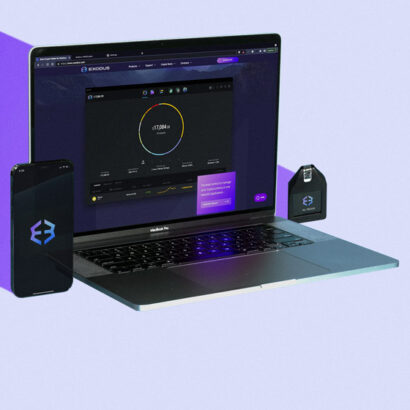Trade and investment apps like RobinHood and WealthSimple have rolled out the ability to invest in Bitcoin, Ethereum and other assets. While this sounds easy enough, contained within the same app where you invest your life savings responsibly into GME, should you trust these apps?
It often seems too good to be true, that the same trading app you use to invest in the stock market also lets you buy crypto. But the truth is, when you use that traditional trading app, you’re buying crypto without actually buying crypto. So if you want exposure to the Bitcoin market without signing up for a centralized crypto exchange, what are your options?
Many companies have publicly disclosed some of their crypto holdings, making it possible to support the cryptocurrency by proxy. Other companies, who already have reliable stocks, are considering adding crypto services into their portfolio. Finally, you’ve a heard of acronyms like ETFs that might have something to do with cryptocurrency. These funds supposedly track the price of Bitcoin and offer you a more indirect exposure.
Here, we breakdown the best investments you can make in crypto without directly investing in crypto and look at the pros and cons of each of these different methods. Additionally, nascent regulation around ETFs means that this issue will continue to evolve in the United States.
Buying Crypto on Trading Apps
Don’t Use RobinHood!
RobinHood gained notoriety in the last year as many people working-from-home with too much time on their hands waded into the stock market. It wasn’t long until RobinHood would offer users the ability to buy cryptocurrency alongside more traditional stocks. RobinHood operates by taking a commission fee on each trade. It may look like there are no fees but the commission often ends up being higher than on other crypto exchanges and platforms.
But the real issue and concern is that RobinHood doesn’t let you move any crypto into or out of the app. That means that you will never own the private keys to your crypto. Given the less-than-stellar reputation of this company, you are trusting that they’ll actually buy and hold the crypto for you. Basically, you’re buying an IOU from an app.
WealthSimple for Crypto?
While WealthSimple started off by offering similar services to RobinHood, it has since improved its offerings. Now, you are able to transfer Bitcoin and Ethereum in and out of your WealthSimple account. Since you can actually take your assets out, you can also get the private keys to your crypto. According to their site, they plan to allow for users to transfer out other types of cryptocurrencies as well. But this then beckons the question, why not simply use an exchange like Gemini, FTX, Crypto.com or Binance.
Or consider Newton or ShakePay that have low, transparent fees for Canadians?
Stock Trading Apps
While these apps are easy to use and might give you exposure to the market, they aren’t recommended.
Apps like RobinHood will never give you the private keys to your crypto. Other services like WealthSimple will let you transfer the crypto out, but at that point you’ve got to wonder what’s the point? Meanwhile these apps take commission on trades which are often less transparent than centralized cryptocurrency exchanges.
Is it Worthwhile to Invest in Pro-Crypto Companies?
Indirect crypto exposure is also possible by looking at companies with large, declared holdings or partnerships with cryptocurrency. Compared to cryptocurrency itself, buying stocks or shares in a company has substantially lower risk as these companies are a lot less volatile.
However, while you might be getting a bit of exposure to Bitcoin and other popular cryptos, it is minimal.
Companies with Large Bitcoin or Crypto Holdings
Almost 60 companies have publicly declared that they hold a certain amount of Bitcoin on their balance sheets. While many of these companies are directly involved in blockchain investment or cryptocurrency trading. But there are a few other technology companies that use Bitcoin as a speculative investment.
Let’s break down a few of the companies with large Bitcoin holdings that might be worth investing in. While some large exchanges like Coinbase are available on public exchanges, they have not yet built up a years-long track record as a promising investment.
- Microstrategy (MSTR)
This is a business intelligence company that owns more Bitcoin than any other publicly traded company, a whopping 114,042 Bitcoin. This is equivalent to more than $6.6 billion in value, roughly double what they spent on their purchase. - Tesla (TSLA)
The Elon Musk-backed electric vehicle venture currently owns 42,902 Bitcoin which is equivalent to almost $2.5 billion. Thus far, Tesla has made more than $1 billion in profit from the Bitcoin holdings. Unlike Microstrategy, Musk regularly tweets about cryptocurrency on Twitter which impacts its price. - Block –formerly Square Inc (SQ)
Jack Dorsey’s payment processing company has attempted to integrate Bitcoin trading into its popular CashApp. While the company currently holds 8,027 Bitcoin valued at more than $450 million. However, this strategy has been criticized as few people are actually trading or sending Bitcoin through the CashApp. For now, this crypto might be best served as a speculative asset for the company.
Companies Dabbling in Crypto
Now let’s say that we’re hedging our bets. We’ve bought some MSTR, TSLA and SQ and now are interested in companies that might be wading into the crypto space. If their endeavors succeed, that means that it may be a net positive for the company’s stock. Otherwise, many of these companies are already well-established bluechip stocks making them an effective investment – even if they don’t end up being associated with crypto.
Here’s how some of these companies are involved in the crypto space.
Payment and Finance
Several prominent payment and finance companies including Visa (V), MasterCard (MA) and PayPal (PYPL) are integrating crypto into their business models and offerings. Visa is piloting crypto-backed credit cards and believes that more and more people will enter crypto through NFTs; Visa is focused on cross-chain payment systems to bridge the worlds of crypto and traditional finance, allowing almost-instantaneous crypto purchases. This year, MasterCard revealed collaborations with crypto exchanges, allowing customers to pay with non-fiat backed currencies. Not to be outdone by these credit card companies, PayPal now allows users to buy crypto directly from the app as well.
Gaming
GameStop (GME) has undergone a recent renaissance, pivoting to include next-generation Web 3.0 gaming and NFTs in its financial strategy. There are rumors that Loopring (LRC) has been tapped to develop their NFT storefront, which would allow for cheap trading and facilitate decentralized gaming. New blockchain gaming companies have already raised almost $500 million, but it is unclear if this will be a bubble or if this space will blow up. Crypto-based gaming companies and traditional companies pivoting to blockchain-based games are a riskier investment than V, MC, or PYPL.
Bitcoin and Crypto ETFs
An ETF is an Exchange Traded Fund which tracks the price of an asset, or a large group of assets. There’s been a lot of recent talk about the legality of crypto and Bitcoin ETFs in Canada and the United States. ETFs aim to mimic the currency without offering or requiring you to have direct exposure to it. In theory, if Bitcoin goes up then the Bitcoin ETF should follow.
ETFs boil down to two different types:
- Spot ETFs track real-time prices
This also assumes that the company running the ETF has bought the BTC to back it up - Futures ETFs are backed by Derivatives
In other words they offer contracts to buy back the asset at a certain price in the future.
The cryptocurrency exchange Gemini advocated for a Bitcoin ETF through the Security and Exchanges Commission (SEC) but it was denied. The SEC cited concerns over the lax regulation of current cryptocurrency exchanges.
ProShares Bitcoin Strategy ETF (BITO) succeeded in receiving approval in the United States in October of 2021. However, it is not tied directly to the current or spot price of Bitcoin and instead tracks Bitcoin futures. Canada already has several different ETFs that track the price of Bitcoin and even some that track Ethereum.
While this may be an easy way to gain exposure into crypto without needing to buy and store it yourself, it’s also not exactly your best bet. Compared to buying BTC directly from an exchange and storing it in your own self-custody crypto wallet, the ETF will cost you more to manage and you won’t have the control.
Takeaways
Yes, you can invest in crypto indirectly.
The worst way is to do it through a stock trading app like RobinHood or WealthSimple where fees aren’t completely transparent.
You are better off signing up for and using reputable centralized exchanges like Binance, Gemini, Crypto.com or ShakePay than using the above.
You can also invest in major companies that have Bitcoin holdings on their balance sheets or are actively integrating cryptocurrency into the business model. We mentioned some of the more reputable stocks in the space (MSTR, TSLA, SQ, V, MC, PYPL) as well as gaming companies which are a little riskier.
Canadians also have the opportunity to invest in ETFs which more directly track the price of Bitcoin or other crypto assets without requiring you to buy and store the assets yourself. If this is what works for you, go ahead and do it. It’s certainly better than sitting on the sidelines. There’s very little risk and it’s very easy.



